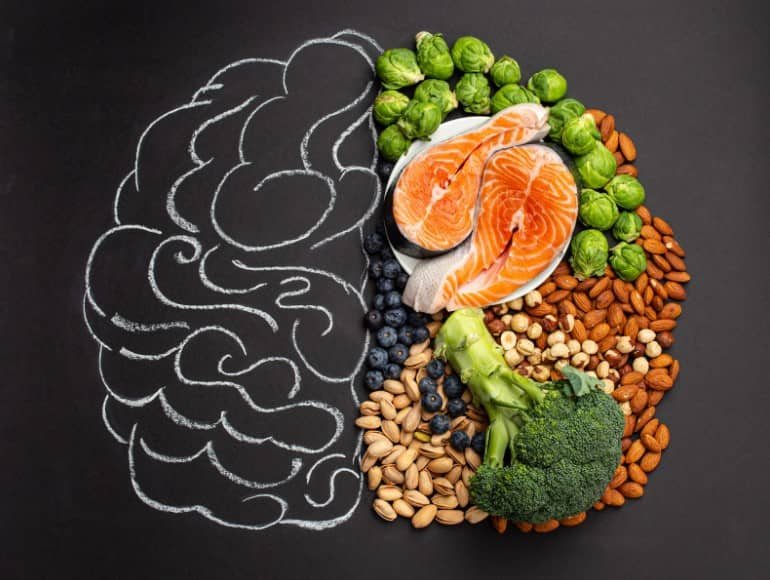Diet plays a critical role in maintaining optimal brain function and mental health. The human brain, though only 2% of the body’s weight, uses about 20% of its energy supply. This energy comes from the food we eat, and the brain’s composition—fats (lipids), proteins, amino acids, micronutrients, and glucose—is significantly influenced by our dietary intake. Understanding our diet and brain function sheds light on the importance of a balanced diet in mental well-being.
Fats: Building Blocks of the Brain
The brain is predominantly made of fats, particularly omega-3 and omega-6 fatty acids. These essential fatty acids, which must be obtained from the diet, play a vital role in maintaining the health of cell membranes. Foods rich in omega-3s, such as fatty fish (salmon, mackerel), walnuts, and flaxseeds, are especially beneficial.
Research has shown that omega-3 fatty acids support cognitive function and may reduce the risk of neurodegenerative conditions like Alzheimer’s disease. Omega-6 fatty acids, found in seeds, nuts, and vegetable oils, complement this by maintaining overall brain structure and function. A balanced intake of these fats is key; an imbalance can contribute to inflammation, which has been linked to mental health disorders such as depression and anxiety.
Proteins and Amino Acids: Mood and Cognition
Proteins and their building blocks, amino acids, are integral to brain function. They are the precursors to neurotransmitters, the chemical messengers that regulate mood, attention, and sleep. For instance:
- Tryptophan, found in turkey, eggs, and cheese, is a precursor to serotonin, often referred to as the “feel-good” neurotransmitter.
- Tyrosine, present in bananas, dairy, and soy products, supports the production of dopamine and norepinephrine, which influence alertness and motivation.
An inadequate supply of these nutrients can lead to neurotransmitter imbalances, potentially exacerbating mental health conditions like depression, ADHD, or anxiety disorders.
Micronutrients: Guardians Against Oxidative Stress
Micronutrients, such as vitamins and minerals, are indispensable for brain health. Antioxidants like vitamins C and E, found in fruits and vegetables, combat oxidative stress—a condition caused by free radicals that damage brain cells over time.
- Blueberries, spinach, and dark chocolate are rich in antioxidants that can slow cognitive decline.
- Minerals such as magnesium and zinc are critical for brain plasticity, the brain’s ability to adapt and form new connections, which is crucial for learning and memory.
Deficiencies in these micronutrients have been linked to increased risks of mental health issues, including anxiety and mood disorders.

Neurotransmitters and mood are directly influenced by the proteins, amino acids, and carbohydrates we consume, demonstrating the critical role of food in emotional regulation. By focusing on a diet rich in nutrient-dense foods, individuals can significantly enhance both their mental health and cognitive abilities.
Carbohydrates: Sustaining Mental Energy
The brain relies on glucose as its primary energy source, and the type of carbohydrates consumed directly impacts mental performance.
- Complex carbohydrates (whole grains, legumes, vegetables) provide a steady release of glucose, supporting sustained attention and mood regulation.
- Simple sugars, in contrast, cause rapid spikes and crashes in blood sugar levels, often leading to irritability and difficulty concentrating.
Maintaining balanced glucose levels is particularly crucial for individuals with mood disorders, as unstable energy levels can exacerbate symptoms of depression and anxiety.
The Connection Between Diet and Mental Health
Emerging research underscores the link between diet and mental health. Poor dietary habits—characterized by high sugar, saturated fat, and processed food consumption—have been associated with higher rates of depression, anxiety, and cognitive decline. Conversely, a Mediterranean-style diet rich in fruits, vegetables, whole grains, lean proteins, and healthy fats has been shown to promote better mental health outcomes.
Practical Tips for Brain-Boosting Nutrition
- Incorporate omega-3-rich foods like salmon and walnuts into your meals.
- Opt for complex carbohydrates such as quinoa and oats for sustained energy.
- Add vibrant fruits and vegetables to your diet to increase antioxidant intake.
- Choose lean proteins like chicken, tofu, or beans to support neurotransmitter health.
- Stay hydrated—adequate water intake is essential for optimal cognitive function.
Expanding the Role of Diet in Mental Health
The interplay between diet and mental health extends beyond brain composition and function. Researchers are increasingly exploring how the gut-brain axis—a bidirectional communication system between the gut and the central nervous system—plays a role in mental health. The gut microbiome, influenced by dietary intake, produces neurotransmitters and other compounds that impact brain function and emotional regulation.
For example:
- A diet rich in probiotic foods (like yogurt, kimchi, and kefir) and prebiotic fibers (found in bananas, onions, and whole grains) supports a healthy gut microbiome.
- Studies suggest that an imbalanced gut microbiome may contribute to conditions like anxiety and depression, highlighting the importance of dietary interventions.
Additionally, maintaining stable blood sugar levels, reducing inflammatory foods, and ensuring an adequate intake of omega-3 fatty acids are essential components of a diet that supports both brain health and emotional well-being.

A balanced diet for brain health is essential for maintaining optimal mental and cognitive performance. The impact of diet on mental health is evident in how nutrients like omega-3 for cognitive function and antioxidants for brain protection contribute to overall well-being.
Supporting Mental Health Through Lifestyle Choices
While diet is foundational, it works synergistically with other lifestyle factors to promote mental health. Incorporating regular exercise, practicing mindfulness, and ensuring sufficient sleep amplify the benefits of a brain-healthy diet. Combining these approaches offers a holistic pathway to mental well-being.
The Takeaway
A balanced diet not only fuels the brain but also lays the foundation for mental resilience and emotional well-being. Prioritizing nutrient-dense foods helps protect the brain from degenerative conditions, regulates mood, and enhances cognitive abilities. Small dietary changes can have profound effects, empowering individuals to support their mental health through intentional eating.
At East Coast Telepsychiatry, we understand that mental health is multifaceted. Our team is here to guide you through personalized strategies that integrate dietary recommendations into your mental health treatment plan. Schedule a consultation today and take the first step toward a balanced, healthier mind.
